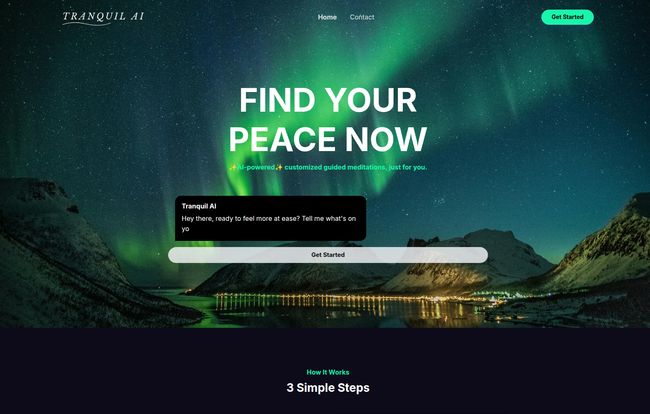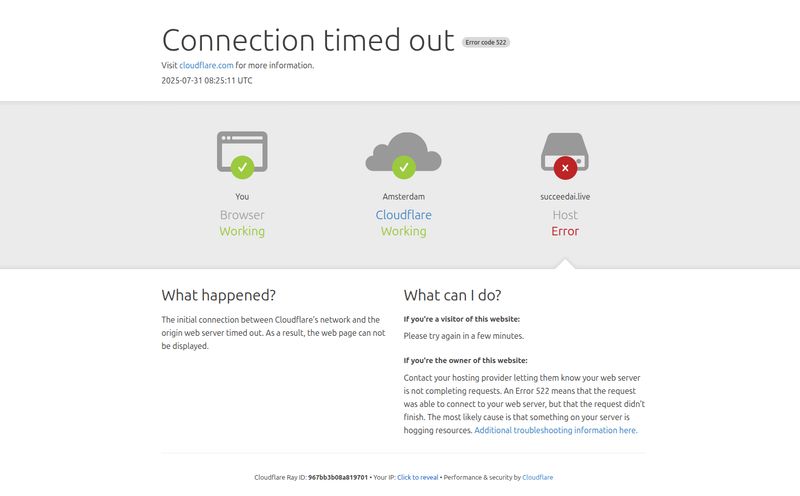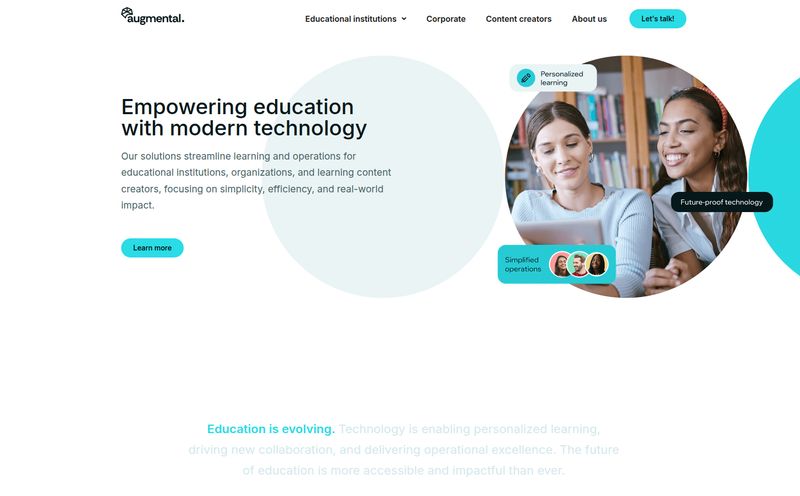How many times have you opened YouTube or a fancy subscription app, determined to find that one perfect guided meditation, only to spend 15 minutes scrolling through a sea of thumbnails with titles like “Deep Cosmic Healing” or “Activate Your Abundance Mindset”? I’ve been there. More times than I can count. My anxiety about finding a meditation to fix my anxiety is, well, ironic.
As an SEO guy, I spend my days swimming in data, trends, and algorithms. So when AI started popping up in everything from my writing tools to my fridge, I was curious, but also a bit skeptical. Especially when it came to wellness. Can a machine really understand the jumbled mess of human emotion?
Then I stumbled upon a tool called Tranquil AI. The premise was simple: you tell it what’s wrong, and it whips up a custom meditation just for you. No app, no fee, no fuss. My inner cynic and my inner tech nerd decided to call a truce and give it a whirl. What could go wrong?
What Exactly is Tranquil AI?
Think of it like a digital bartender for your soul. You slide up to the counter (their website), tell it what’s on your mind—the good, the bad, the ugly—and instead of a cocktail, it serves you a perfectly mixed, guided meditation designed to address that specific feeling. It’s not pulling from a library of pre-recorded files. It’s creating something unique, on the fly, just for you. The best part? The bar tab is zero. It’s completely free and you don’t even have to download anything to your phone, freeing up that precious storage space.
My First Impression: A Surprisingly Simple Path to Calm
The website claims it’s a simple 3-step process, and for once, the marketing fluff is actually true. It’s dead simple.
First, you chat with the AI. There’s a simple text box that prompts you: "Tell me what's on your mind." For my first go, I decided to be brutally honest. I typed something like, “I’m feeling totally fried from a long week of client calls, I’m stressed about a traffic drop on a key site, and my neighbor’s dog won’t stop barking.” A real potpourri of modern-day misery.
Then, you hit “Get Started,” and the AI does its thing. For a moment, you just see the screen working. This is where the magic, or at least the sophisticated code, happens. It’s taking my jumble of complaints and supposedly finding the root cause to build a session around it.

Visit Tranquil AI
And finally, in less than a minute, a custom meditation is ready. You can play it right there in the browser or—and this is a fantastic feature—download it as an audio file. This is huge for me. I can listen on the subway, on a plane, or when I'm walking the dog, no internet required.
The Good, The Bad, and The AI
After using it for a few days, feeding it everything from minor annoyances to bigger anxieties, a clear picture started to form. It’s not perfect, but it’s pretty darn impressive.
The Hyper-Personalization is… Actually Good
This is Tranquil AI’s headline feature, and it delivers. One day I mentioned feeling unfocused and scattered. The meditation it generated had specific cues about gathering my thoughts, like collecting leaves floating on a stream. Another day I talked about feeling frustrated and impatient, and teh session focused on breathing through tension in my shoulders and jaw. It’s the difference between buying a suit off the rack and getting one tailored. The off-the-rack one might fit okay, but the tailored one just feels right. It’s using science-backed mindfulness techniques, but applying them with a sniper’s precision instead of a shotgun’s blast.
Zero-Friction Mindfulness
The biggest barrier to so many digital tools is the friction. Download the app, create an account, endure the 7-day trial pop-ups, enter your credit card... ugh. Tranquil AI has none of that. You go to the website, you type, you listen. It's that simple and it's free. This low barrier to entry is probably its most powerful feature. It makes trying mindfulness feel less like a commitment and more like a quick, easy experiment. The fact that you can just download the audio and go is a chef's kiss.
But Let’s Be Real: The Caveats
Okay, it’s not all sunshine and rainbows. There are a few things to keep in mind. Some in the wellness world might argue that an AI can’t replicate the compassionate presence of a human guide. And they have a point. There's a certain warmth an AI voice, no matter how soothing, can’t fully capture. If you're looking for deep, trauma-informed guidance, this probably isn't the tool for that. You should definitely seek a human professional.
Then there's the privacy question. I'm literally typing my anxieties into a text box on the internet. While Tranquil AI has a privacy policy, you have to be comfortable with that exchange. I personally kept my inputs general—'work stress' instead of naming specific clients, for example. It’s a personal comfort level thing.
Finally, the output is only as good as your input. If you just type “sad,” you’ll get a generic meditation for sadness. If you type “I’m sad because I miss an old friend and it’s a rainy day,” you’ll get something much richer and more specific. You have to be willing to give it a little detail to work with.
Who is Tranquil AI For (And Who Should Maybe Pass)?
So, who’s the ideal user? I see a few groups getting a ton of value from this.
- The Busy Professional: Like James Carter, the startup founder from their testimonials, if you have 10 minutes between meetings and need a quick reset, this is faster than finding a video on YouTube.
- The Mindfulness Skeptic: If you've been hesitant to pay for a Calm or Headspace subscription, this is a completely free way to dip your toes in the water.
- The Tech-Curious: If you’re just fascinated by what AI can do, this is a genuinely cool and useful application of the technology.
Who might want to stick with something else? If you crave community features, live sessions, or a long-term, structured course curriculum, a more established platform like Headspace might be a better fit. And as I said, for deep-seated issues, a human therapist is always the answer.
Your Questions About Tranquil AI Answered
1. How much does Tranquil AI cost?
Nothing! As of right now, Tranquil AI is completely free to use. There are no subscriptions, no hidden fees, and no payment information required.
2. Do I need to download an app to use it?
Nope. It's entirely web-based and works right in your browser on your phone or computer. You can find it at TranquilAI.app.
3. Is my personal information safe?
This is a valid concern with any AI tool. Tranquil AI has a privacy policy on their website that you should read. A good rule of thumb is to avoid sharing highly sensitive, personally identifiable information. Stick to describing your feelings and the general situation.
4. How is this different from apps like Calm or Headspace?
The main difference is the on-demand personalization. While other apps have vast libraries of pre-recorded meditations, Tranquil AI creates a new, unique session every single time based on your immediate input. It's about 'in the moment' relief rather than browsing a catalog.
5. Can I really use the meditations offline?
Yes, and it's one of its best features. After the AI generates your meditation, you get an option to download it as an MP3 audio file, so you can listen anywhere without needing an internet connection.
My Final Verdict
After a week, my inner cynic is quieter. Tranquil AI isn't a replacement for human connection or professional therapy, and it was never meant to be. What it is, however, is a fascinating, powerful, and ridiculously accessible tool. It removes the friction and the cost from getting a dose of mindfulness that’s actually relevant to how you feel right now.
Is it the future of mental wellness? I don’t know. But it’s a very interesting step in that direction. For a free tool that asks for nothing but a moment of your time and a few honest words, the return on investment is pretty incredible. Give it a shot. What have you got to lose? A bit of stress, maybe.
Reference and Sources
The tool's official website: TranquilAI.app
A look at AI's growing role in mental healthcare from Forbes: The Role Of AI In Revolutionizing Mental Health Care
The competitor platform mentioned: Headspace



